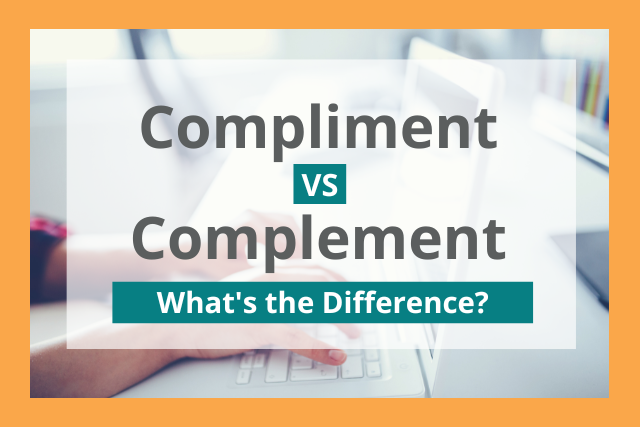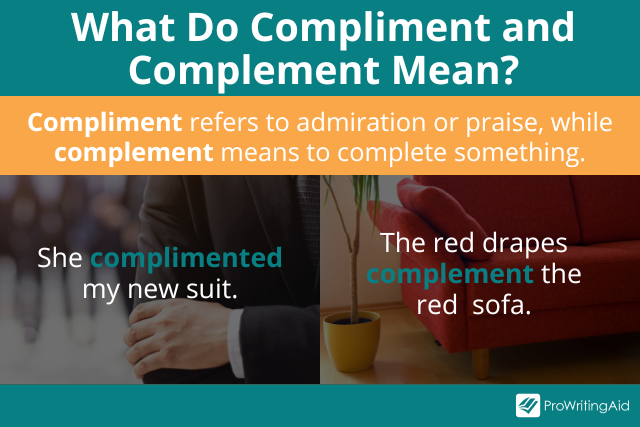
Compliment and complement are two commonly confused words. They sound alike, but they have very different meanings.
So what’s the difference between compliment vs complement?
The short answer is that compliment refers to admiration or praise, while complement means to complete something.
Learn more about the difference between these two words and how to remember their definitions.
Difference Between Compliment vs Complement
Both compliment and complement come from the Latin word complēre, a verb meaning “to fill” or “to fulfill.”
Let’s start with a quick overview of the definition and meaning of compliment and complement.

Compliment Definition and Meaning
Everyone loves to get a compliment. As a noun, it means “an expression of praise or regard,” and as a verb, it means “to give someone praise or encouragement.”
You can compliment someone based on their achievements, how they look, or something they have done. For example, if you tell someone “You’re a very talented writer,” you’ve just given them a compliment.
Compliments can also refer to getting something for free, such as a drink in a restaurant. You might have heard the phrase “with the compliments of” before. This means that something has been given free of charge.
Some common synonyms of compliment include praise, accolade, and admiration. Synonyms of the verb compliment include commend, praise, and extol.
Complement Definition and Meaning
The word complement refers to things that work perfectly with each other. Complements make something complete.
Like compliment, complement with an E can either be a noun or a verb. As a noun, it means “something that completes.” As a verb, it means “to complete” or “to make whole.”
Often, complement is used to show things that go well together, such as colors, musical instruments, and clothes. For example, you might say, “That color complements your skin beautifully.”
In art, colors are often arranged in a circle called a color wheel. Complementary colors are those that are directly opposite from each other, such as green and red or blue and orange.
Some common synonyms of the noun form of complement include accompaniment, supplement, and accessory. Common synonyms of the verb form include accompany, go with, and round off.
Examples of Compliment vs Complement in Sentences
The best way to learn how to spell a word correctly is by seeing it in use. Here are some examples of compliment vs complement in complete sentences.
Let’s start with some examples of compliment:
- She complimented my new suit.
- They complimented her on her new job.
- He paid me a compliment when he said my English grammar was excellent.
- Tom is always paying me compliments about how I dress.
- The dessert was free, with the compliments of the chef.
- The food at the event was complimentary.
- Consider it a compliment when the doorman asks for your ID.
- When Jeff gets a compliment on his favorite tie, he doesn’t stop smiling.
- Telling Annie she looks better now than she did before comes across as a backhanded compliment.
- All the compliments from her schoolmates embarrassed her.
- In my drawing class, the instructor paid me a double-edged compliment by saying my work was “excellent... for a beginner.”
Now here are some examples of complement:
- The violin is the perfect complement for the trumpet in this composition.
- This creamy sauce complements the spicy meat.
- That hat really complements your dress.
- Tennis racquets and tennis balls are complementary goods because sales of one item usually increase sales of the other.
- Our wine will be a nice complement to grilled salmon.
- Peaches and cream complement each other perfectly.
- The neutral taste of rice makes an excellent complement to a curry.
- The rational and the irrational complement each other. Individually, they are far less powerful.
- A written examination will complement the practical test.
- Nutmeg, parsley, and cider all complement the flavor of these heirloom white beans.
- The dark red drapes complement the red leather sofa.
How to Remember the Correct Spelling and Usage of Compliment vs Complement
You can remember that complement with an E refers to something that completes something else. The word complete has an E after the L. Therefore, if you’re talking about something related to completion, the correct word is complement, which also has an E after the L.
One tip for remembering compliment with an I is by remembering that to pay someone a compliment means to express admiration. The word admiration has an I in it, so you should use the spelling compliment.
If you are struggling with words that sound alike, try using ProWritingAid’s homonym report to help you catch and correct them in your writing. This tool will make sure you use the right word every time.


